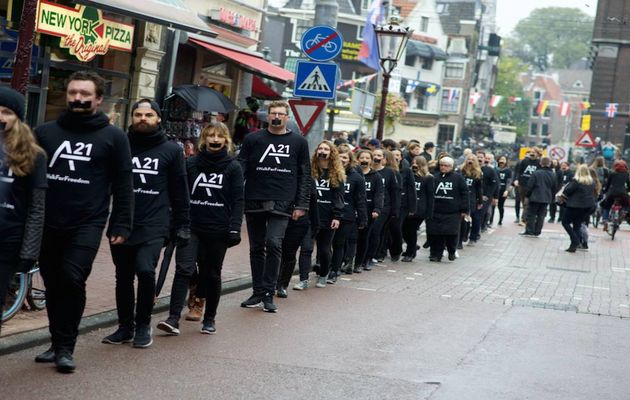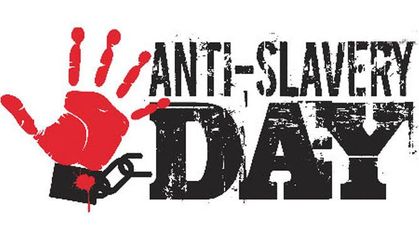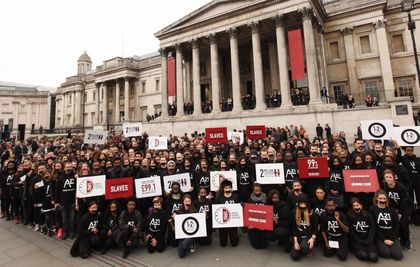Child trafficking, forced labour, domestic servitude and trafficking for sexual exploitation, are real problems today. Many events all around Europe have tried to raise awareness about it.
 A walk for freedom in Rotterdam / A21
A walk for freedom in Rotterdam / A21
Anti-slavery Day falls on October 18, and provides an opportunity to draw attention to one of the major concerns of the world today. It aims at pressurizing the government, local authorities, public institutions and public and private companies to address the issue of human trafficking.
The Anti-Slavery Day Bill, introduced by Anthony Steen MP in UK, became law there in 2010. Modern-day slavery is defined as child trafficking, forced labour, domestic servitude and trafficking for sexual exploitation.
The main purpose of enacting the law was to discourage forced slavery, punish the perpetrators who indulge in illegal trafficking and enhance protection and support for the victims worldwide.
 October,18 Anti Slavery Day
October,18 Anti Slavery DayIn an age that celebrates freedom, equality and opportunity, it’s unbelievable that slavery and trafficking still exists. Around the world almost 30 million people are trapped in modern slavery, living as forced labourers, forced prostitutes, child soldiers and child brides in forced marriages. Human trafficking strips people of their rights and ignores the inherent dignity and value we each have.
Slavery is big business. Profits made off the back of these victims are estimated at US $150 billion a year. Tragically, it’s the fastest growing international crime and one of the largest income sources for organised crime. Slavery is prohibited under Article 4 of Universal Declaration of Human Rights.
DIFFERENT EVENTS AROUND EUROPE
This last weekend, there have been so many ways to get involved with Anti-Slavery Day all around Europe. Below you’ll find some of them:
European Freedom Network exists to help the body of Christ in Europe work together effectively to prevent and combat human trafficking and sexual exploitation, and to seek the restoration of its victims.
EFN is a strategic network of the European Evangelical Alliance that connects active and emerging ministries and other stakeholders across Europe, and serves those partners by providing the encouragement, advice, resources and prayer that they need for effective action and cooperation. EFN works with national Alliances to encourage and empower local churches and to build national and regional networks capable of addressing the issues of human trafficking and the needs of people involved.
A21 Walk for Freedom - A21 is a campaign fighting human trafficking. They have organised a walk for Anti-Slavery Day in all the main cities of Europe , America, and Australia.
In UK, there have been events, not only this weekend, but during the whole month of October. You can find details about events across the country at the Anti-Slavery Day website.
 Anti slavery day in London
Anti slavery day in LondonThe British Christian organization CARE, has many Anti-Slavery resources
Sport for Freedom uses sports to raise awareness and tackle modern slavery and trafficking. For Anti-Slavery Day they organised Cycle for Freedom.
FREEDOM SUNDAY
Freedom Sunday is a global day of worship, prayer and action on human trafficking.
Through Freedom Sunday, faith communities annually make commitments to take action to prevent the crime of human trafficking in our local and global communities. Their desire is continuing to be a resource and an event that will include a growing number of faith communities around the world.
“Through our worship and by inspiring local community action, we seek to prevent the global crime of human trafficking”, they said in their website.

Las opiniones vertidas por nuestros colaboradores se realizan a nivel personal, pudiendo coincidir o no con la postura de la dirección de Protestante Digital.
Si quieres comentar o